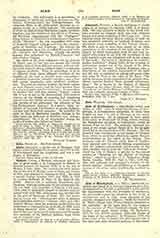

Alan of Tewkesbury, a Benedictine abbot and writer, d. 1202. Alan is stated by Gervase of Canterbury, a contemporary chronicler, to have been English by race, i.e. not of Norman, or any grant, extraction. He is supposed to have spent some years at Benevento in Italy, before entering the Benedictine novitiate at Canterbury, where he became Prior in 1179. He zealously espoused the cause of the clergy against Henry II in the struggle which led to the martyrdom of St. Thomas. He was removed from Canterbury to the Abbey of Tewkesbury, where he could less effectively oppose Henry’s encroachments on the rights of the church. The intimacy with St. Thomas which Alan of Tewkesbury enjoyed, and his almost lifelong acquaintance with the politico-ecclesiastical controversies of the time, qualified him to write the “Life of St. Thomas,” which (as Life of Becket) is printed in the second volume of “Materials for the History of Thomas. Becket”, edited by the Rev. J. C. Robertson (Rolls Series, London, 1875-85; Part I, CXC, 1475-88). Alan also collected and arranged a number of the Saint’s epistles. Critics are doubtful as to the genuineness of the other works traditionally ascribed to him.
E. MACPHERSON

